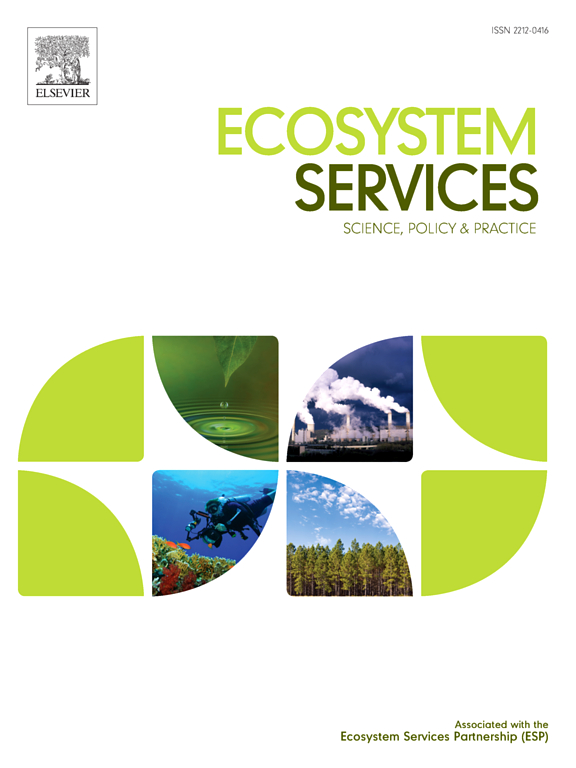Mind the income gap: Income from wood production exceed income from providing diverse ecosystem services from Europe’s forests
IF 6.6
2区 环境科学与生态学
Q1 ECOLOGY
引用次数: 0
Abstract
Forests supply multiple ecosystem services, categorized into provisioning (e.g. wood), regulating (e.g. climate change mitigation, biodiversity protection) and cultural (e.g. recreation) services. While European policies have set the target for forest management to supply multiple ecosystem services, the literature emphasises that regulating and cultural ecosystem services tend to be undersupplied, as most management incentives focus on provisioning services.
We conducted a pan-European survey of forest owners and managers on sources of forest income and extrapolated the results with spatially referenced data and machine learning.
We gathered relative income and profitability levels derived from supplying different groups of forest ecosystem services per forest plot. We show that approximately eighty percent of forest income is currently linked to provisioning services. Supplying regulating and cultural services is rarely perceived as profitable. We then identified two clusters of European forest owners and managers. The first, managing predominantly conifer-dominated forests in thinly populated areas of Northern and Eastern Europe, derives nearly all its forest income from wood production. The second, managing forests characterized by broadleaved species, proximity to cities, and with a higher share being designated as Natura 2000, dominates in Western and Southern Europe. In this second cluster, about one-third of forest income comes from regulating and cultural ecosystem services, but at low profitability. We conclude by arguing that recognizing both this spatial divide across Europe and the gap between forest owners’ economic incentives to provide preliminary provisioning ecosystem services, and societal demand emphasising regulating and cultural ecosystem services, is key for designing customized, effective policies for multiple forest ecosystem services.
注意收入差距:木材生产的收入超过了欧洲森林提供多样化生态系统服务的收入
森林提供多种生态系统服务,分类为供应(如木材)、调节(如减缓气候变化、保护生物多样性)和文化(如娱乐)服务。虽然欧洲政策为森林管理设定了提供多种生态系统服务的目标,但文献强调,由于大多数管理激励措施侧重于提供服务,因此调节和文化生态系统服务往往供应不足。我们对全欧洲的森林所有者和管理者进行了一项关于森林收入来源的调查,并利用空间参考数据和机器学习来推断结果。我们收集了每个森林样地提供不同类型森林生态系统服务的相对收入和盈利水平。我们表明,目前大约80%的森林收入与提供服务有关。提供监管和文化服务很少被认为是有利可图的。然后,我们确定了两个欧洲森林所有者和管理者群体。第一个国家在北欧和东欧人口稀少的地区经营以针叶林为主的森林,其森林收入几乎全部来自木材生产。第二,管理以阔叶物种为特征的森林,靠近城市,并且被指定为Natura 2000的比例更高,在西欧和南欧占主导地位。在第二个集群中,大约三分之一的森林收入来自调节和文化生态系统服务,但盈利能力较低。最后,我们认为,认识到整个欧洲的这种空间差异,以及森林所有者提供初步生态系统服务的经济动机与强调调节和文化生态系统服务的社会需求之间的差距,是设计针对多种森林生态系统服务的定制化有效政策的关键。
本文章由计算机程序翻译,如有差异,请以英文原文为准。
求助全文
约1分钟内获得全文
求助全文
来源期刊

Ecosystem Services
ECOLOGYENVIRONMENTAL SCIENCES&-ENVIRONMENTAL SCIENCES
CiteScore
14.90
自引率
7.90%
发文量
109
期刊介绍:
Ecosystem Services is an international, interdisciplinary journal that is associated with the Ecosystem Services Partnership (ESP). The journal is dedicated to exploring the science, policy, and practice related to ecosystem services, which are the various ways in which ecosystems contribute to human well-being, both directly and indirectly.
Ecosystem Services contributes to the broader goal of ensuring that the benefits of ecosystems are recognized, valued, and sustainably managed for the well-being of current and future generations. The journal serves as a platform for scholars, practitioners, policymakers, and other stakeholders to share their findings and insights, fostering collaboration and innovation in the field of ecosystem services.
 求助内容:
求助内容: 应助结果提醒方式:
应助结果提醒方式:


